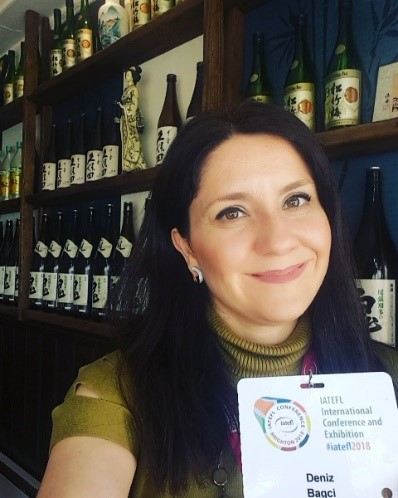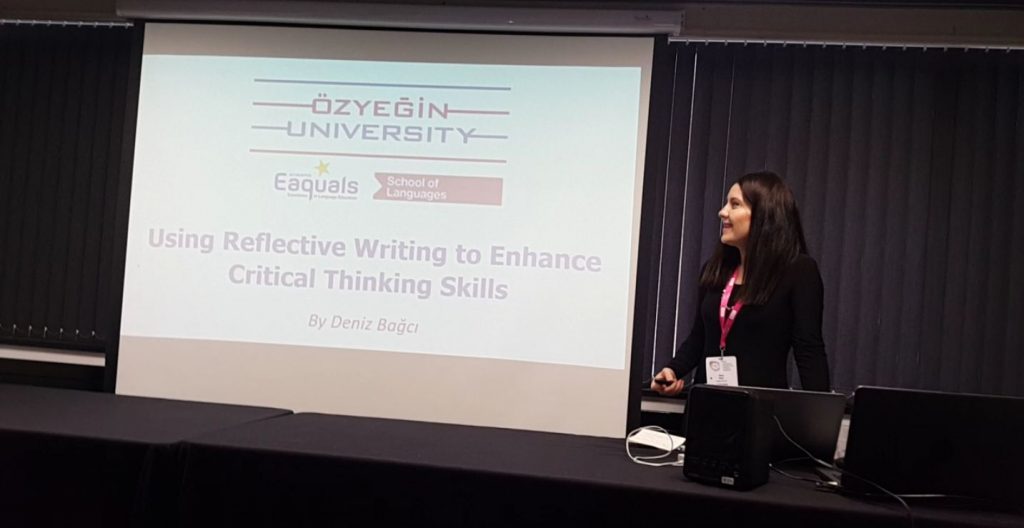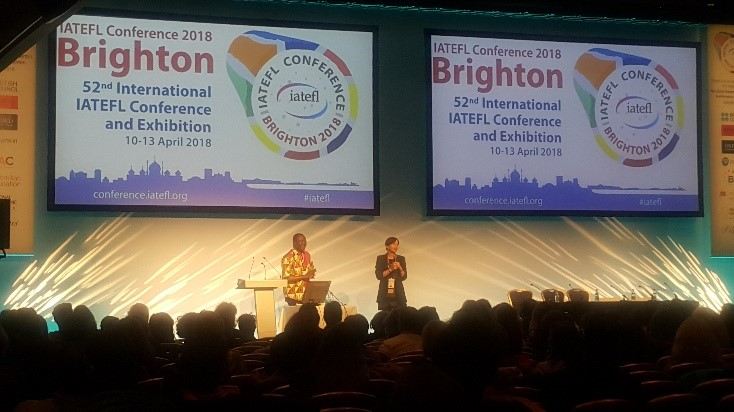Reflection on the 52nd IATEFL Conference and Exhibition 2018 Brighton by Deniz Bağcı
Conference Title: 52nd IATEFL Conference and Exhibition 2018 Brighton
Presentation Title: Using Reflective Writing to Enhance Critical Thinking Skills
Presenter: Deniz Bağcı

a. Brief information about the conference
52nd IATEFL Conference and Exhibition, one of the major international events in the field of ELT took place in Brighton, UK this year. Brighton is a lovely coastal town which is warmer and brighter compared to the other parts of England. Besides, luckily, the conference was held in two buildings by the sea: Brighton Hilton Hotel and Brighton Centre a few blocks apart from each other forming a wonderful scenery attendees rushing from pillar to post trying to catch the next presentation they are interested in. IATEFL conference is a huge event that lasts 5 days, starting with the pre-conference events on the first day and those events include the meetings of the SIGs which stands for Special Interest Groups concentrating on different areas of interest in ELT such as ESP, Learning Technologies, Leadership & Management and Business English. Members of these SIGs attend those meetings and a separate admission fee is required to be paid to be able to attend. However, the Welcome Reception and Party is also held on Monday and the Exhibition officially starts on the first day. In the following days, presentations commence each day starting with a “How to” session followed by a Plenary Session. This year’s plenary speakers were Lourdes Ortega, Dorothy Zemach, Brita Fernandez Schmidt, Barry O’Sullivan and John Agard and they all had powerful and wonderful speeches. After that each time slot provided at least 20 different presentations simultaneously that attendees can choose from according to their interests. It is not that easy to choose one from the program and head to a different room where the next talk will be but there was an application which made our lives easier since it provided all the data about the coming talks, information about them and their location, so it was easier to choose one from the coming talks and add it to the list and easily go to the next talk that would take place in another room, most probably far from where we were at that moment. The presentations ended at 18:10 in the evening; however, it didn’t mean that we could go back to our hotel and sleep. There were evening events between 7pm and 9pm planned by the conference committee providing a wonderful opportunity for making new friends. During the day, the exhibition hall served as an international showcase of the latest resources, services and publications from course providers, publishers, digital innovators, game companies and many more. The exhibition also hosted the IATEFL Job Fair where people could meet with employers and browse vacancies. This year almost 3000 ELT professionals attended IATEFL Brighton and it was a wonderful event that any ELT professional should attend at least once in a lifetime. It was a wonderful opportunity to refresh all the knowledge I already have and learn about the new advances in the area of ELT.
b. Brief information about my presentation:
In this conference, I have presented the research and analyses of the data I had collected the previous year. Last year, I have decided to use reflective writing in my writing classes to see its effects on students’ critical thinking skills as well as their writing skills. I collected data from my main class and support class both of which are in B2 level and composed of 15 and 16 students respectively. However, I used my main class as experimental group which used reflective practice in class and my support class was the control group and I analyzed their UF/EMI Critical Thinking Skills Inventory scores and writing exam results at the beginning and at the end of the term to compare their results with the results of the experimental group. I asked the students in the experimental group to write a reflection for each essay they had written in class and explain how they feel and what they think about their writing experience. Before starting reflective practice in class, at the beginning of the term, I have used a Turkish adaptation of UF/EMI Critical Thinking Skills Inventory to identify students’ CTSs scores. I have used the same inventory at the end of the term to see the change in their CTSs. Furthermore, I have used the 1st and 2nd writing exam scores of both groups to see if there is a significant change in their writing exam scores. At the end of the term, I have conducted one-on-one interviews with the students from the experimental group to find out their insights about the use of reflective writing in class. In my presentation, I have shared the results of the findings of this research.

c. “Highlights from Conference”
There were over 500 presentations in IATEFL Conference Brighton 2018 and I couldn’t help myself overcome a different version of “FOMO” which stands for “Fear of Missing Out”. Anytime I attended a presentation, I felt like I was missing 20 other interesting presentations but that was the case. From the very first day, I recognized that fear and I decided to attend a talk named “How to get the most out of this conference (with Susan Barduhn)” and from the very first moment I had an idea about how to benefit from this conference in the most effective way. In her presentation, Susan Barduhn highlighted that participants shouldn’t see this conference as a place that they can listen to presentations, learn new ideas or refresh themselves. She pointed out that, IATEFL is the best place to make new friends, build networks and discuss ideas with the many other ELT professionals from all around the world.
Then I have decided to attend presentations of the people whom I haven’t heard of before, rather than the popular ELT gurus that we can come across with in any ELT conference in Turkey. Another decision was about choosing a few focus points to follow during the conference and it helped me to control my FOMO a little bit more. In general, I followed the presentations about business English and critical thinking skills since they are my research areas. Whenever it was not possible to find something interesting about these areas, I just picked something randomly and some of these random choices surprised me more than the presentations I had higher expectations from. I’m just going to be sharing the most interesting ones here:

The Disney creativity strategy in business English context by Marjorie Rosenberg (IATEFL Vice President)
In her workshop, Marjorie Rosenberg tried to teach us Walt Disney’s business strategy based on his ability to look at ideas from different perspectives. This workshop gave me a lot of interesting ideas about how to use business cases in English classes by using creative strategy. She divided the audience into groups of 10 and each group were given a different discussion topic about a new idea to be implemented in our assumed company. In each group, 3 people acted as dreamers, 3 as realistic, 3 as critics and 1 as an observer. Everyone discussed the idea according to their given role and at the end observers of each group shared their ideas about the discussion in their groups.
Designing BE classes through English as a lingua franca by Karin Heuert Galvao (i-Study Interactive Learning)
In her talk, Karin Heuert, who is a teacher trainer specialized in Business English, gave us valuable information about how she designs her business English classes. The procedure Karin follows is:
1. Listen to students and the companies that they work for
2. Ask the right questions about the needs of the students
3. Test your students’ knowledge
4. Research about your students’ fields
Karin is an entrepreneur in this field and more information can be found on her website: www.istudy.com.br
E-ductive Grammar: “discover, discuss, demonstrate”- digitally! by Catherine Prewett-Schrempf and Anna Weninger (University of Applied Sciences for Management & Communication, Vienna)
In this talk, Catherine and Anna explained how they used authentic materials and Moodle to teach grammar to a group of first-semester BA students of Management & Entrepreneurship with ten parallel groups. They prepared a poster by finding authentic sentences with the target grammar structures from magazines like Forbes, Financial Times, etc. They prepared videos by using the poster and uploaded the videos on Moodle. They created a blended learning environment for their students and they said it was very beneficial for their students. Catherine Prewett-Schrempf is the head of the competence center for business English at the University of Applied Sciences for Management and Communication and this is the link for university’s web page: http://www.fh-wien.ac.at/en/tourismus-management/competence-center-for-business-english/
Teaching one-to-one by Helen Strong (Freelance, Germany)
In her talk, Helen Strong explained how teaching one-to-one is different from teaching groups and she shared her one-to-one teaching experience with her adult students, generally executive level managers trying to learn English for business purposes. Helen is an entrepreneur in teaching business English and she is also the events coordinator of BE SIG (Business English Special Interest Group). Helen Strong lives in Germany and here is the link for her web site: http://helenstrong.de/contact/
The most important part of her talk was the solutions that she offered to solve the problem about interaction patterns in one-to-one teaching. She recommended using a voice recorder or giving the student different roles while speaking. Besides, she said she doesn’t plan her lessons from before but on the day of instruction, she asks the students what they need (Do you have a business trip? or Do you have a presentation?) and she teaches according to the most urgent need of the students. Helen also gave information about the resources she uses frequently and she finds very useful. The list is as follows:
– Business One:One, Oxford University Press
– thebigproject.co.uk.
– TED Talks
– Quizlet
– onestopemglish.com
– Teaching Unplugged.
Engaging pre-work Business English students through a project by Graciela Alchini (Freelance, Mexico)
In her talk, Graciela Alchini explained her project that she used to enhance her students’ awareness about the value of Business English. She asked her students to create and work on a product or service that is innovative and related to their field of study. At the beginning students were asked to create 3 different products and choose the best one and prepare a marketing plan and a CSR project for that product or service. Students were asked to prepare a Pecha Kucha presentation about their product. Besides, students were asked to prepare a marketing campaign week by week by writing reports, letters, short e-mails, infographics, commercials and they even filmed a business meeting.
At the end of the term, they held a 20-minute presentation about their products. They have to wear professional clothes on the presentation day and teacher and class will act as possible customers. Graciela said this project was not only useful in terms of improving her students’ language skills but also 2 of her students created their own businesses by using their projects and earned a lot of money.
Short mystery games to teach critical thinking by Walton Burns (Alphabet Publishing)
In his workshop, Walton Burns taught us how to use detective stories to teach critical thinking to our students. First, he shares the details of a crime scene and the statements of the witnesses. Then he asks students to find the criminal and the reason behind the crime by providing logical reasons and at the end he provides the real solution of the case. His activities can be downloaded from the website here: https://www.teacherspayteachers.com/Store/Walton-Burns
Business English: organic skills marinated in objectives served with vocabulary by Iwonna Dubicka (NELC, University of Tourism, Barcelona)
This presentation was about how to use the course book “Business Partner” by Pearson to teach Business English.
We have ways of making you talk better by Stephen Reilly (Paris, France)
In his presentation, Stephen Reilly talked about the usefulness of recording his voice in ELT classes and he showed us his improvement in time by making us listen to his recordings.
Using big data to boost students’ performance engagement by Marina Kladova (Skyeng)
Marina Kladova, told us about their analyses of more than 10.000 students’ learning styles and the education platform they use for their learners. You can have more information from the the following web-site: https://en.skyeng.ru/
Posthumanism and foreign language teaching: practical ideas by Arda Arıkan (Antalya, Turkey)
Actually this talk was my favorite in the whole conference since it was completely different from the others. It was not about a practical activity to be used in an ELT class but it was a wonderful talk that was raising our awareness about the world we live in and what we have to deal with as teachers of English and what we have to be careful about to “normalize” our world by normalizing the language we use in ELT classes. I loved the examples he provided:
-you can’t chase two rabbits at once (“just leave the rabbits alone” he said )
-killing two birds with one stone (“just leave the birds alone” he said )
-odd one out (“just leave the odd one alone” he said )
-word hunt (“just leave the words alone” he said )
-hangman (“just leave the man alone” he said )
I think he was right.
The conference ended with John Agard’s plenary talk which was very sentimental from my perspective. He was a Queen’s Gold Medal winning poet who has written widely for both adults and children. He was born in Guyana and moved to England in 1977. I would like to share one of his poems he read in his speech. I think it was a wonderful final for the conference this year.
LISTEN MR OXFORD DON
Me not no Oxford don
me a simple immigrant
from Clapham Common
I didn’t graduate
I immigrate
But listen Mr Oxford don
I’m a man on de run
and a man on de run
is a dangerous one
I ent have no gun
I ent have no knife
but mugging de Queen’s English
is the story of my life
I don’t need to axe
to split/ up yu syntax
I don’t need no hammer
to mash/ up yu grammar
I warning you Mr Oxford don
I’m a wanted man
and a wanted man
is a dangerous one
Dem accuse me of assault
on de Oxford dictionary/
imagine a concise peaceful man like me/
dem want me serve time
for inciting rhyme to riot
but I tekking it quiet
down here in Clapham Common
I’m not a violent man Mr Oxford don
I only armed wit mih human breath
but human breath
is a dangerous weapon
So mek dem send one big word after me
I ent serving no jail sentence
I slashing suffix in self-defence
I bashing future wit present tense
and if necessary
I making de Queen’s English accessory/to my offence

Leave a Reply